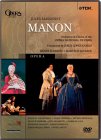![Amilcare Ponchielli - La Gioconda [2005]](/pictures/1049622.jpg) Amilcare Ponchielli - La Gioconda | DVD | (28/08/2006)
from £N/A
| Saving you £N/A (N/A%)
| RRP
Amilcare Ponchielli - La Gioconda | DVD | (28/08/2006)
from £N/A
| Saving you £N/A (N/A%)
| RRP From the renowned opera house in Barcelona, TDK presents a new production of Ponchielli's Romantic opera La Gioconda, realised in cooperation with the Arena di Verona and successfully shown in the famous opera festival's 2005 programme. The Barcelona production features internationally acclaimed singers as well as acclaimed soloists and ballet dancers from the Gran Teatre del Liceu. The Title role is sung by American Deborah Voigt, one of the most important dramatic sopranos of her generation. As her blind mother Polish Contralto Ewa Podles spreads the overwhelming warmth and broad range of her voice while convincingly conveying the character's suffering. Canadian tenor Richard Margison as the exiled nobleman Enzo and Italian baritone Carlo Guelfi as the spy and agent provocateur Barnaba excel opposite the two female characters. The overall approach is simplicity and clarity - the costumes are dark and elegant with only some recognisable and significant colourings. The atmosphere of the city of Venice is depicted as the harbinger of death - in director Pier Luigi Pizzi's words, Venice is 'metaphysical and cold, moving us to tears. ...The carnival is not associated with pleasure and illusion but is felt to be a way of exorcising the fear of death.
 Massenet: Manon -- Paris Opera/Lopez-Cobos | DVD | (30/01/2006)
from £N/A
| Saving you £N/A (N/A%)
| RRP
Massenet: Manon -- Paris Opera/Lopez-Cobos | DVD | (30/01/2006)
from £N/A
| Saving you £N/A (N/A%)
| RRP A performance of the Massenet opera 'Manon'. The Paris National Opera Orchestra and Chorus are conducted by Jesus Lopez-Cobos.
![Les Contes D'Hoffmann [2002]](/pictures/1028166.jpg) Les Contes D'Hoffmann | DVD | (31/05/2004)
from £N/A
| Saving you £N/A (N/A%)
| RRP
Les Contes D'Hoffmann | DVD | (31/05/2004)
from £N/A
| Saving you £N/A (N/A%)
| RRP Hoffmann a poet and composer is in love with the prima donna Stella. As the opera begins she is appearing in her most famous role: Donna Anna in Mozart's Don Giovanni. Hoffmann's Muse declares that she will win back the artist and protect him from any further amorous obsessions. In order to do so she will assume the identity of Hoffmann's friend Nicklausse.Councillor Lindorf also desires the diva Stella and he bribes her servant Andres into giving him a letter addressed to Hoffmann which contains the key to her dressing room. As the curtain falls on Act I of Don Giovanni Luther and his waiters hurriedly prepare for the arrival of Hoffmann and his friends.Hoffmann is in an agitated state of mind but is soon persuaded to sing the ballad of Kleinzack. While doing so he is distracted and recalls his first love. His friends bring him back to reality and he finishes the song. Suddenly Hoffmann sees Lindorf and a heated argument develops between them. Hoffmann reveals that Lindorf has always brought him bad luck. When three of the poet's friends boast about their mistresses Hoffmann declares that Stella embodies three types of woman: the young girl the artist and the courtesan. Hoffman asks his friends if they would like to hear about three of his past loves. Despite Luther's warning that the curtain is about to rise on Act II of Don Giovanni the crowd fill their glasses and prepare to listen to Hoffmann's tales.

Please wait. Loading...
This site uses cookies.
More details in our privacy policy